William G. T. Shedd Collection (13 vols.)
Digital Logos Edition
Overview
Called a leading Reformed theologian of the 1800s, William G. T. Shedd was a prolific theologian, historian, and literary genius. He affirmed the inspiration of Scripture against the advances of modernism and higher criticism, and championed Reformed theology throughout his lifetime. Throughout his career, Shedd tackled controversial topics such as the atonement and the doctrine of endless punishment, and he took care to view doctrine from within the larger context of history. The rhetorical force of Shedd’s theology stems from his literary studies, his pastoral heart from his years as a minister, and his theological and historical eloquence from years of defending Reformed theology in the face of increasing skepticism and doubt.
The 13-volume William G. T. Shedd Collection contains Shedd’s famous 2-volume History of Christian Doctrine, his extensive writings in defense of Calvinism, two volumes of sermons, and five volumes of articles and essays on topics ranging from evolution to Pelagianism. With the Logos edition of the William G. T. Shedd Collection, Scripture references are linked to your Greek and Hebrew texts, along with English translations. Your digital library allows you to perform powerful searches and word studies, and instantly click your way through all of Shedd’s works. That makes the Logos edition of the William G.T. Shedd collection the easiest and most accessible version for reading and research!

- Shedd’s 2-volume History of Christian Doctrine
- 73 individual theological articles and essays
- Scripture references hyperlinked to the electronic Bibles in your digital library
- Title: William G.T. Shedd Collection
- Author: William G.T. Shedd
- Volumes: 13
- Pages: 4,467
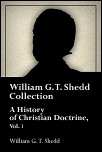
Shedd’s 2-volume History of Christian Doctrine was written after several years of preparation, and offers a comprehensive account of the gradual construction of all the doctrines of Christianity. Shedd believed that the history of Christian doctrine was one of the strongest defenses of the Christian faith, and his History centers on Nicene trinitarianism, Augustine anthropology, and Anselmic soteriology.
Volume 1 contains an overview of the philosophical influences on the Early Church, including Platonism, Aristotelianism, and other philosophical schools which left the imprint on the development of theology. He also chronicles the relationship between reason and revelation, and provides a history of Trinitarian theology and Christology.
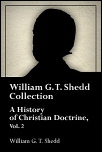
Volume 2 of Shedd’s History of Christian Doctrine explores the history of Christian anthropology, including theories of the soul and conceptions of pre-existence. Shedd argues that the influence of Greek anthropology can be seen in the development of theology in the Early Church, and in the doctrine of original sin articulated by Tertullian, Cyprian, Hilary, Ambrose, and Augustine. The history of original sin concludes with Luther, Calvin, Melanchthon, and Zwingli’s connection between original sin and regeneration.
Shedd also offers a sweeping history of soteriology from the beginning of the church to the modern era, and surveys Abelard, Bonaventure, Aquinas, Duns Scotus, and others, along with the perennial emergence of Pelagianism and semi-Pelagianism in the church. He concludes with a survey of eschatology, including conceptions of Christ’s second coming from various traditions within the church.
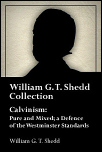
Shedd’s volume on Calvinism defines and defends the tenets of Calvinism against the rising influence of modernism and the increased fragmentation in American churches. In particular, Shedd addresses theological controversy in the Presbyterian Church, prompted by a proposed revision from the Westminster Standards. In this volume, he appeals to the history of Calvinism to prevent latitudinarian change in the Presbyterian Church, and justifies the theology of Calvin—and his intellectual and theological predecessor, Augustine—for the present day.
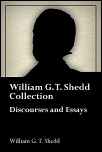
This volume contains seven essays on theological topics. First published elsewhere, Shedd assembled them into this singular volume for publication in 1856. These essays cover a range of topics, including the method of theological study, the doctrine of the original sin, and the doctrine of the atonement—themes to which Shedd returns in nearly all of his later writings.
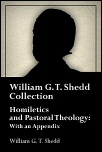
Although Shedd is often remembered as a theologian and historian, he also devoted his writing to the theory and practice of preaching. He forcefully argues that rhetorical elegance—the kind required for good preaching—is not merely a matter of aesthetics, but of ethics. He describes the relationship between eloquence and exegesis, the process of choosing a text and crafting a sermon, and the nature of extemporaneous preaching. The second half of this volume defines and explains the relationship between preaching and pastoral theology. Shedd explores not only the intellectual responsibilities of clergy, but also the pastoral function of leadership.
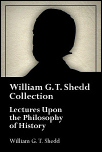
First written during the winter of 1853–1854 as an introductory course on ecclesiastical history at Andover Theological Seminary, these four lectures tackle the idea of history, the nature and definition of secular history, and the nature of church history. These lectures lay the theoretical groundwork for Shedd’s 2-volume History of Christian Doctrine—also included in this collection.
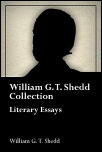
This volume contains a series of essays on aesthetics and literature, and the disciplines of theology and philosophy are well-represented. In additions to his contributions to theology and philosophy, Shedd was a literary genius and devoted to the establishment of literary reflection in the church. In these essays, he encourages his readers toward lives of refinement and reflection. This volume also contains lengthy essays on Puritans, Coleridge, and Augustine.
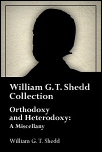
Orthodoxy and Heterodoxy is comprised of articles written for special occasions or for publication in various periodicals. These articles cover topics in theology and ethics, and attempt to define both orthodoxy and its task. In this volume, Shedd aims to defend the historical faith—both its doctrines and the theologians who espouse them—and he summons the church to preserve the historic creeds and maintain the ancient disciplines. The volume also includes four political articles on the American Civil War.
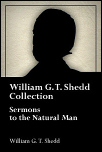
This volume contains twenty sermons on sin and salvation. Each sermon is preached with a clear view of sin in mind, and outlines the necessity and benefits of redemption in Christ. In these sermons, Shedd outlines the doctrine of the atonement, and argues that only the atonement completely meets and satisfies God’s demands of human beings. Shedd preaches against the pervasive sins of his time and ours—the doctrine of natural virtue, innate goodness, and self-reliance.
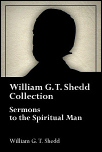
Shedd’s Sermons to the Spiritual Man complements his Sermons to the Natural Man. Whereas his previous collection of sermons emphasized sin and suffering, this volume preaches forgiveness and victory over sin. Sermons to the Spiritual Man contains twenty-six sermons on the glory of God, faith, holiness, sanctification, prayer, evangelism, and numerous other topics.
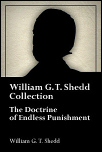
The prospect of eternal punishment represents an insurmountable obstacle for many. Christianity is often rejected outright for its doctrine of hell, and even believers occasionally hold skeptical views. This volume was prepared to address this difficult doctrine for those both inside and outside the church. In The Doctrine of Endless Punishment, Shedd makes a rational case and a biblical case for the doctrine, along with a historical sketch. He surveys the depiction of hell in the Bible, along with the technical terms use. He grounds the doctrine of endless punishment not in history, the Bible, or the church, but in the decrees of God.
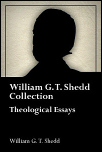
This volume contains essays on the most difficult—and important—themes in theology and philosophical theology. These essays are written in the firm conviction that theology and philosophy contain no inherent contradiction with each other. Shedd defends historical Calvinism, original sin, and the atonement, and he attempts to ground these doctrines in the principles of reason. This volume also contains essays on theological method and the idea of evolution.
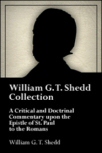
First published in 1879, this volume contains Shedd’s detailed and thorough commentary on each chapter of the book of Romans. In this verse-by-verse commentary, Shedd pays careful attention to the Greek text, while providing detailed exposition for pastors and scholars. Widely cited and highly influential for generations of commentators on Romans, this commentary has become a standard text on Paul’s most important epistle.
William G. T. Shedd was born in 1820 in Acton, Massachusetts. He attended the University of Vermont, where he studied under James Marsh and encountered the writings of Samuel Taylor Coleridge. He graduated in 1839 and entered Andover Theological Seminary, where he studied under Leonard Woods. At Andover, he became committed to Calvinism in general and Presbyterianism in particular. Upon graduating in 1843, he became a minister at the congregational church in Brandon, Vermont for two years. He taught at the University of Vermont from 1845 to 1852, at Auburn Theological Seminary from 1852 to 1854, and at Andover Theological Seminary from 1854 to 1862. He began teaching at Union Theological Seminary in 1864, where he remained until his death in 1894. While at Union, he defended the Reformed theology of Old School Presbyterianism against the increasing influence of modernism and higher criticism. In addition to the works included in this collection, he is also well-known for his 7-volume Complete Works of Samuel Taylor Coleridge and his Dogmatic Theology, available from Logos.
Reviews
2 ratings

Kevin Bratcher
6/12/2018
Andrew
11/29/2017